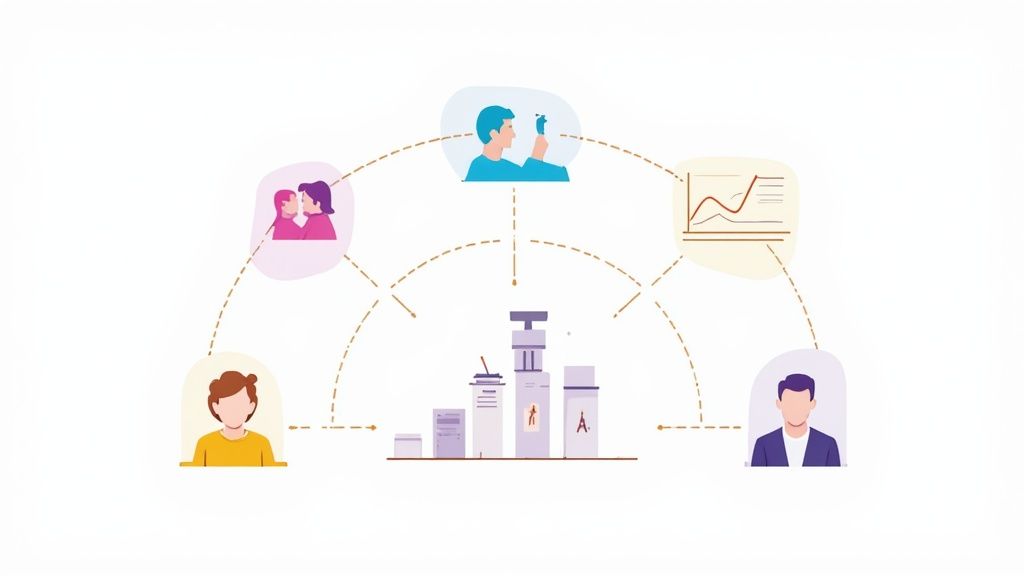
Top Account Manager Job Description Guide
Published
What Makes an Account Manager: Beyond the Basic Description

An account manager isn't simply a sales role; it's the foundation of client retention and consistent revenue. They serve as the crucial connection between a company and its clients, nurturing relationships while simultaneously developing business. This dual focus demands a specific skill set and a thorough understanding of client needs. This understanding informs the creation of a compelling job description and helps potential candidates present themselves as valuable relationship experts.
The core function of an account manager revolves around daily client interaction. They ensure client needs are met and maintain ongoing business activity. This emphasis on existing client relationships distinguishes account management from sales, which primarily focuses on acquiring new clients through methods like lead generation and cold-calling.
For example, a salesperson concentrates on closing a deal. The account manager then steps in after the sale to nurture the relationship and introduce new products or services to the client. This difference highlights the long-term, relationship-focused nature of account management. According to Investopedia, the average base salary for an account manager in the U.S. is over $62,000 annually. Total compensation, which includes bonuses and commissions, can range from $41,000 to $99,000. Learn more about the role of an Account Manager here: Learn more about Account Manager roles
Key Qualities of a Successful Account Manager
Truly understanding account management goes beyond simply reading a job description. Successful account managers possess a blend of hard and soft skills that allow them to thrive in this multifaceted role. Simply fulfilling the listed responsibilities isn't enough. True success comes from embodying these key qualities:
- Strategic Thinking: Anticipating client needs and developing proactive solutions that align client goals with company objectives.
- Relationship Building: Excelling at cultivating strong, trust-based relationships with clients, moving beyond transactions to build strategic partnerships.
- Communication Prowess: Communicating clearly and effectively, conveying complex information and navigating difficult conversations with ease.
- Business Acumen: Possessing a solid understanding of business principles, identifying growth opportunities, and contributing to revenue generation.
- Problem-Solving Skills: Resolving client issues quickly and efficiently, ensuring client satisfaction and minimizing any business disruptions.
The Impact of Account Management on Business Growth
Effective account management directly fuels business growth in several key ways. By nurturing client relationships, account managers improve client retention rates, reducing churn and establishing a reliable revenue stream. They also identify opportunities for upselling and cross-selling, increasing the company's share of the client's business. These activities not only boost revenue but also strengthen client loyalty, leading to long-term partnerships and sustainable growth. A strong account management team is a valuable asset for any organization aiming to build a loyal customer base and achieve its revenue goals.
Crafting Responsibilities That Drive Client Retention

A successful account manager job description hinges on carefully structured responsibilities. These responsibilities must balance nurturing client relationships with driving revenue growth. This careful calibration ensures both client satisfaction and contributes to the overall success of the business. Top-performing organizations recognize this balance and structure their account manager duties accordingly.
This isn't just about keeping clients happy; it's about creating a mutually beneficial partnership where both the client and the company thrive.
Defining Core Responsibilities in an Account Manager Job Description
The daily work of a successful account manager goes beyond simply maintaining client relationships. It encompasses strategic account planning, coordinating with cross-functional teams, and advocating for clients within their own organization. This multifaceted role requires individuals who can effectively represent both the client and the company.
Account managers act as a bridge between the client's needs and the company's capabilities.
For example, a skilled account manager anticipates client needs and proactively develops solutions. This strengthens the client-company relationship and positions the account manager as a trusted advisor. Additionally, successful account managers excel at coordinating internal resources, often working with teams from different departments such as marketing, product development, and technical support, to ensure seamless project execution and client satisfaction.
This collaborative approach ensures that everyone is working towards a common goal: client success.
Examples of Key Responsibilities
Here are some key responsibilities typically found in a well-crafted account manager job description:
Relationship Management: Building and maintaining strong client relationships based on trust and open communication. This involves regular communication, understanding client needs, and proactively addressing concerns.
Strategic Planning: Developing and executing strategic account plans to achieve client objectives and contribute to revenue growth. This includes identifying upselling and cross-selling opportunities.
Internal Coordination: Collaborating effectively with internal teams to ensure seamless project delivery and client satisfaction. This might include coordinating with product development to incorporate client feedback or working with technical support to resolve client issues.
Performance Monitoring: Tracking key performance indicators (KPIs) and providing regular updates to clients on progress and results. This data-driven approach demonstrates value and keeps clients informed about the impact of the partnership.
Illustrating Impact Through a Table
To further illustrate the impact of these core responsibilities, the following table provides a detailed breakdown:
To understand the impact of these responsibilities, consider the following table which breaks down the key areas of focus and their connection to business outcomes:
| Responsibility Category | Specific Tasks | Business Impact |
|---|---|---|
| Relationship Management | Regular client communication, addressing client concerns, building rapport | Increased client retention, stronger client relationships |
| Strategic Planning | Developing account plans, identifying growth opportunities, upselling/cross-selling | Increased revenue generation, expanded market share |
| Internal Coordination | Collaborating with internal teams, ensuring project delivery, resolving client issues | Improved operational efficiency, enhanced client satisfaction |
This table outlines how each responsibility contributes to both client satisfaction and business growth.
This detailed approach to defining account manager responsibilities sets the stage for attracting and retaining high-performing individuals who can significantly contribute to a company's bottom line. By focusing on driving measurable results and building valuable, long-term client partnerships, companies can create a culture of success and mutual growth for both the client and the account manager. This moves beyond simply maintaining relationships and focuses on achieving tangible outcomes.
The Skill Stack: What Truly Makes Account Managers Exceptional

Exceptional account managers possess a unique blend of skills extending beyond the basics. These skills differentiate a good account manager from a truly great one. By analyzing high-performing professionals and their job descriptions, we uncover the essential hard skills and soft skills that drive success in this demanding role.
Mastering the Hard Skills: Technical Proficiency
Hard skills form the foundation of an account manager's technical competence. These quantifiable abilities, learned through education and experience, allow them to efficiently perform specific tasks. For example, CRM mastery is crucial.
Account managers must navigate CRM systems like Salesforce or HubSpot to track client interactions, manage data, and generate reports. Data analysis skills are also essential for interpreting account performance and identifying growth opportunities.
This involves understanding key performance indicators (KPIs) and using data-driven insights to inform client strategies. Strong presentation techniques are also needed to effectively communicate complex information to clients and internal stakeholders. This includes crafting compelling presentations and confidently delivering them to diverse audiences.
Cultivating the Soft Skills: The Art of Relationship Intelligence
Technical skills alone aren't enough. Exceptional account managers also possess strong soft skills. These interpersonal qualities enable them to build relationships and navigate complex situations.
Soft skills are harder to quantify but equally essential for success. One such skill is consultative listening: actively listening to clients to understand their needs and concerns. This builds rapport and establishes a strong foundation for a trusted advisor relationship.
Strategic negotiation is another critical soft skill. It enables account managers to navigate client expectations and company objectives, finding mutually beneficial solutions. This requires understanding the client's priorities and crafting proposals that address their specific needs while aligning with company goals.
Moreover, cross-functional leadership is key. This skill comes into play when coordinating internal teams and resources to ensure seamless project delivery and client satisfaction. Account managers must influence and motivate individuals across different departments to work collaboratively and achieve shared objectives.
The Synergy of Skills and Experience
The most successful account managers blend their hard and soft skills to become invaluable strategic partners for their clients. This combination of technical proficiency and relationship intelligence allows them to understand client needs, develop tailored solutions, and deliver exceptional results.
It's this comprehensive skill set that ultimately differentiates high-performing account managers, making them highly sought-after professionals in any industry. In 2025, the average annual salary for an account manager stands near $65,890 in the United States, though this can vary. Find more detailed statistics here. You might also be interested in: How to master account management. This holistic approach to skill development is essential for anyone aspiring to excel in account management.
Measuring Success: Beyond Basic Client Satisfaction Metrics

What distinguishes a truly exceptional account manager from one who simply meets the basic requirements? While client satisfaction remains important, it's only one piece of the puzzle. This section explores the key performance indicators (KPIs) that leading organizations use to evaluate account management excellence, going beyond simple satisfaction surveys.
Key Metrics for Account Management Success
Modern businesses recognize that assessing account manager performance requires a more nuanced approach. This means looking beyond client satisfaction scores and incorporating metrics that reflect both strong relationships and revenue growth.
Wallet share growth, for instance, measures the percentage of a client's total spending allocated to your company. It's a vital indicator of an account manager's ability to expand their influence within an existing account.
Account expansion percentages, which track the growth of revenue from existing accounts, demonstrate an account manager’s skill in identifying and converting upselling and cross-selling opportunities.
Finally, client advocacy scores, measuring the likelihood of a client recommending your company, provide valuable insights into overall client loyalty and the strength of the relationships nurtured by the account manager.
These metrics provide a more complete and insightful picture of an account manager’s overall contribution than satisfaction scores alone.
Industry Variations in Performance Metrics
The importance of these metrics can differ significantly across industries. An account manager job description in the tech sector might emphasize different metrics than one in healthcare, for example.
In dynamic industries like B2B SaaS, rapid account expansion and high client retention rates are often prioritized. In industries with longer sales cycles, such as manufacturing, building relationships and fostering client advocacy may initially hold more weight. Account managers play a critical role in driving performance in client relationship management (CRM), directly impacting both business growth and customer retention.
Commonly used metrics include renewal, retention, and churn rates; customer lifetime value; satisfaction and net promoter scores; upsell and cross-sell rates; and overall revenue growth. Compensation often involves a base salary combined with performance-based incentives. Learn more about account manager performance: Discover more insights
To better illustrate how metrics can vary across industries, let’s examine the following table:
Account Manager Performance Metrics Comparison
This table compares different performance metrics used to evaluate account managers across various industries, showing how expectations may vary by sector.
| Performance Metric | B2B SaaS | Retail | Financial Services | Manufacturing |
|---|---|---|---|---|
| Client Retention Rate | High Emphasis | Moderate Emphasis | High Emphasis | Moderate Emphasis |
| Account Expansion % | High Emphasis | Moderate Emphasis | Low Emphasis | Low Emphasis |
| Client Advocacy Score | Moderate Emphasis | High Emphasis | High Emphasis | Moderate Emphasis |
| Wallet Share Growth | High Emphasis | Low Emphasis | Moderate Emphasis | Low Emphasis |
As shown in the table, client retention is highly emphasized in B2B SaaS and Financial Services, while client advocacy is crucial across Retail and Financial Services. B2B SaaS places significant importance on both account expansion and wallet share growth, while these are less emphasized in other sectors.
Balancing Relationships and Revenue: The Balanced Scorecard Approach
Progressive organizations are adopting balanced scorecards to evaluate account managers. These scorecards combine relationship-focused metrics (such as client satisfaction and advocacy) with revenue-focused metrics (such as wallet share growth and account expansion).
This balanced approach encourages account managers to prioritize nurturing client relationships while also driving business growth, creating a sustainable and mutually beneficial partnership. By using a balanced scorecard, companies can develop a comprehensive understanding of account manager performance, aligning individual goals with overall business objectives.
Furthermore, balanced scorecards offer a valuable framework for career development, helping account managers identify areas for improvement and monitor their progress toward becoming truly exceptional performers.
Compensation Reality Check: What Top Account Managers Actually Earn
Let's move beyond general salary expectations and explore the key factors influencing account manager compensation. What truly distinguishes average earners from top performers? It's not just about years of experience. Factors like industry specialization, portfolio complexity, and strong client relationships play a vital role.
Industry Specialization and Its Impact on Earnings
The industry an account manager works in significantly affects their earning potential. Certain sectors consistently offer higher compensation due to various factors, including higher profit margins, specialized knowledge, and intense competition for skilled professionals.
For instance, account managers in the tech industry, especially B2B SaaS, often earn higher salaries than those in traditional retail. This reflects the rapid growth and specialized skills needed in this sector. Similarly, account managers in financial services tend to earn more due to the complex nature of their products and services. This specialized knowledge and the high-stakes environment contribute to greater earning potential.
Portfolio Complexity: A Key Driver of Compensation
An account manager's portfolio complexity also plays a significant role in their earnings. Managing key accounts with complex needs and high revenue potential typically commands a higher salary than managing smaller, less complex accounts. It's comparable to managing a diversified investment portfolio versus a single stock. The more diverse and complex the portfolio, the greater the expertise required, justifying higher compensation.
Account managers handling global accounts or those requiring multilingual skills often earn a premium. These roles demand additional skills and responsibilities, which naturally lead to higher salaries. This reflects the added complexity and responsibility involved in navigating international markets and cultural nuances.
Relationship Depth: More Than Just Client Satisfaction
While client satisfaction is essential, an account manager's true value lies in building deep, trusted relationships with clients. Account managers who become trusted advisors to their clients are invaluable to their organizations.
These strong relationships can lead to increased wallet share, higher client retention rates, and more organic growth opportunities. Consequently, companies are willing to invest more in account managers who can demonstrate a proven ability to cultivate and leverage these strong client relationships. This investment recognizes the direct impact of these relationships on business growth and long-term success. Check out our guide on how to master account management.
Beyond Salary: The Importance of Non-Salary Components
Top-performing account managers look beyond just a high base salary. They seek comprehensive compensation packages that reflect their value and contribute to their professional growth.
This includes considerations such as:
- Performance-based bonuses: Linking compensation directly to performance motivates account managers to exceed expectations and contribute significantly to revenue growth.
- Opportunities for professional development: Access to training, conferences, and mentorship programs helps enhance skills and supports career advancement.
- Equity or profit-sharing: These options provide a sense of ownership and align the account manager's success with the overall success of the company.
- Flexible work arrangements: Remote work options and flexible schedules are increasingly valued for work-life balance and attracting top talent.
By understanding these factors, both employers and candidates can create competitive compensation packages that attract and retain top account managers, ultimately driving business success and client satisfaction. These non-salary components are essential for building a motivated and high-performing account management team.
Crafting Job Descriptions That Attract Exceptional Talent
The quality of your account manager job description often determines the caliber of applicants you attract. In today's competitive hiring environment, a generic list of responsibilities won't attract top-tier candidates. Your job description needs to strategically showcase the role's impact, highlight your company culture, and clearly define the path to success.
Moving Beyond Generic Descriptions: Focusing on Outcomes
Effective job postings emphasize the impact of the role, not just the tasks. Instead of stating "Manage client accounts," try something like, "Drive client growth and retention by building strategic partnerships and exceeding revenue targets." This outcome-focused approach attracts ambitious professionals looking to make a tangible difference.
For example, rather than listing "Prepare reports," you could say, "Analyze performance data to identify growth opportunities and provide data-driven insights to clients." This highlights the strategic value the account manager brings and paints a clearer picture of their day-to-day responsibilities. For more insights, read our article on how to master account management.
Communicating Company Culture Authentically
Authentically showcasing your company culture is vital for attracting candidates who will flourish in your environment. Ditch the meaningless buzzwords. Instead, use specific examples to illustrate your values and work environment. If you value collaboration, describe how account managers interact with other teams. If work-life balance is a priority, mention flexible work options.
This helps potential candidates visualize themselves as part of your team and see if their values align with yours. The result? Better hires who are not only skilled but also culturally aligned, leading to a stronger and more productive team.
Structuring Compensation to Attract Top Talent
Transparency about compensation is key. While a salary range is a good starting point, highlighting potential bonuses, commissions, and other incentives can be very appealing. Also, emphasizing non-salary benefits like professional development and flexible work arrangements can attract high-performing individuals.
This transparent approach builds trust and appeals to candidates motivated by more than just base salary. It demonstrates that you value your employees and are willing to invest in their growth, both financially and professionally.
A Step-by-Step Framework for Creating Compelling Job Descriptions
Here’s a practical framework to develop job descriptions that attract exceptional talent:
- Start with a compelling title: Instead of "Account Manager," consider "Strategic Account Manager" or "Client Success Manager."
- Highlight the impact: Focus on the role's contribution to company success and client growth.
- Showcase your company culture: Use concrete examples and avoid generic language.
- Be transparent about compensation: Clearly outline the salary range and benefits.
- Use strong action verbs: Begin each responsibility with an action verb for better engagement.
- Provide context: Explain the importance of each responsibility and how it contributes to the overall goals.
By following these guidelines, you can craft job descriptions that attract top-tier account managers, contributing to your company's overall success. Ready to begin your search? Explore opportunities on Influencer Marketing Jobs for a dynamic career in the influencer marketing industry.